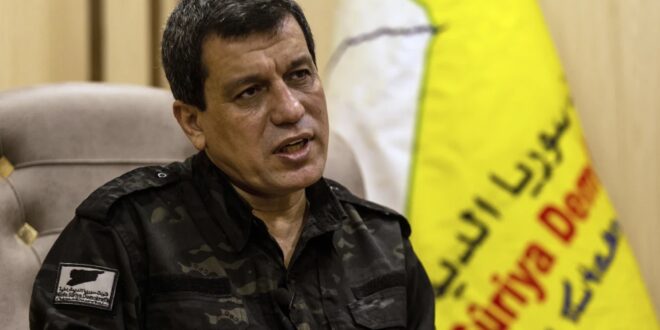The leader of the U.S.-backed Kurdish forces in northeast Syria in an interview with The Associated Press called for international mediators to continue pushing for diplomatic solutions to the complex web of conflicts in the Middle Eastern country, including the escalating Turkish bombardment of Kurdish areas.
Turkey has intensified its airstrikes in northern Iraq and northeastern Syria following an Oct. 23 attack on a defense company in Ankara that killed five people and wounded more than 20. Turkish airstrikes targeted dozens of sites believed to be linked to or affiliated with the Kurdistan’s Workers’ Party (PKK), which claimed responsibility for the attack.
Mazloum Abdi, commander-in-chief of the Syrian Democratic Forces (SDF), said that the attack in Ankara served as an excuse for a long-planned Turkish operation in Syria.
“The Turks claim that these attacks are a response to the recent activity in Ankara. But that is not the reason, because the type and continuity of the attacks now entering their sixth day show that this is not a mere response. The Ankara incident was just an excuse,” Abdi told the AP in an interview Monday evening.
He alleged that the Turkish strikes, which have damaged electricity and oil facilities and bakeries, have had severe consequences for civilians and are part of a broader strategy by Turkey to force a demographic shift by pushing Kurdish residents out of the area.
The strikes killed at least 18 people, mostly civilians, and injured more than 60. Abdi said in some cases Turkish strikes had targeted emergency teams responding to the initial strike.
Turkish bombardment hinders fight against Islamic State group
Despite the strikes, Abdi said: “We are open to dialogue with all parties, including Turkey, even though their attacks persist.”
He appealed to the U.S.-led coalition, formed to fight the Islamic State militant group, and to other mediators to continue to push for diplomatic solutions.
“We hope that these dialogues that we are talking about, which are taking place through mediation, will continue and reach results,” Abdi said.
He also expressed support for reported efforts to jumpstart peace talks between Turkish authorities and the PKK, saying that if their issues are “resolved, it will have a positive impact on the Kurdish issue in Syria as well.”
The PKK is considered a terror organization by Turkey’s Western allies, including the United States. Turkey and the U.S., however, disagree on the status of the Syrian Kurdish groups, which have been allied with Washington in the fight against IS in Syria.
Turkey’s President Recep Tayyip Erdogan visited the site of last week’s attack at Turkish Aerospace Industries (TUSAS) on Tuesday.
“We will not hesitate to use all the means, tools, and resources at our disposal to end terrorism,” Erdogan declared to TUSAS employees, gathered for the unveiling of a new domestically produced helicopter.
“Such treacherous and nefarious actions are the last gasps of the separatist organization,” he said. “They have no place in the future of our region or our country.”
However, also on Tuesday, Erdogan expressed tacit approval for recent comments by Nationalist Movement Party leader Devlet Bahceli suggesting that imprisoned PKK leader Abdullah Ocalan could be granted parole if he renounces violence and disbands the organization.
The escalation in northern Syria comes as the United States has agreed to a gradual troop reduction in Iraq, part of a larger drawdown expected to conclude by the end of 2026.
While the withdrawal applies solely to Iraq, with no immediate plans to exit Syria, Abdi expressed concern over how the coalition’s diminishing presence in the region could affect operations in Syria.
“We, along with coalition forces, conduct daily activities to neutralize ISIS cells, and if the coalition withdraws, the threat level would rise across the region,” Abdi said.
He added that Turkish bombardment has hindered the SDF’s ability to conduct anti-IS operations, delaying two planned campaigns against cells in Syria.
U.S. officials have yet to announce any specific timeline for troop reductions in Syria, though discussions continue amid rising tensions.
Analysts have said that a U.S. departure could lead to increased pressure on the SDF from both Turkish and Syrian government forces, exacerbating the region’s security vacuum and the conflict’s toll on civilians.
Talks are ongoing between SDF and Assad’s government
Abdi said that dialogue between the SDF and the government of Bashar Assad in Damascus has been ongoing since the early years of the 13-year-old Syrian uprising that turned into a civil war, though these discussions have yielded limited progress.
“We have made numerous attempts to reach an agreement with the Syrian regime, but they have yet to produce results,” he said. The main sticking point, he said, has been the Syrian government’s reluctance to recognize the SDF’s administrative and military autonomy in the region. The Kurdish forces have called for a constitutional change that formalizes the SDF’s role in security and governance after more than a decade of self-administration.
“For us, there are some red lines,” Abdi said.
The prospect of reconciliation between Turkey and the Syrian government presents additional challenges. There have been several attempts at a rapprochement between Damascus and Ankara that so far have not progressed to an agreement.
According to Abdi, Turkey is pushing for a deal that would dismantle the existing self-administration in northeastern Syria.
“The Turkish government said clearly that they would reconcile with the Syrian regime on the basis of eliminating the existing status of this region, which makes us their target,” he said.
The proposed reactivation of the 1998 Adana Agreement between Turkey and Syria, aimed at addressing security concerns along their shared border, could have serious ramifications for the Kurdish region.
 Eurasia Press & News
Eurasia Press & News



